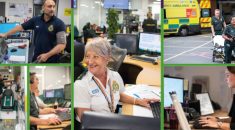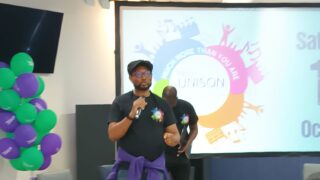Photos © Marcus Rose
Early this morning a team of 26 London Ambulance Service (LAS) paramedics, many of them UNISON members, left a foggy East London for a 1,000-mile drive across Europe to Poland, in an extraordinary humanitarian convoy.
They will deliver 10 reconditioned ambulances filled with medical supplies, to be used by the Ukraine ambulance staff tackling the terrible casualties of Russia’s invasion, as well as two vans full of much-needed items – such as clothing and toiletries – to the refugees amassing on the Ukraine-Polish border.
The relief effort is the result of a collaboration between the ambulance trust and its paramedics, who have collected the donations and are volunteering in their own time to make the journey. It’s also had the support, with a hefty donation to match, from the UNISON London Ambulance branch.
Branch secretary Eddie Brand said: “This is such an important cause. Our members are showing real solidarity with the people of Ukraine. I’m so full of admiration for them.”
Today’s journey is the result of two separate initiatives coming together, and three weeks of intense planning.

For paramedic and UNISON member Eva Bartoskova (pictured above), who is part-Czech, part-Slovak, it started with a phone call three weeks ago, from her aunt, who lives in the Czech Republic.
Just before leaving London, Eva explained. “My aunt got in touch and told us how overwhelming events are in Ukraine and how everyone there was helping. And she had offered her home to host a Ukrainian family. I felt that I really wanted to do something. But it’s easier when things are unfolding on your doorstep and you can dive straight in. It’s hard when you’re so far away.”
The next day she created a JustGiving page, with the thought of raising money and going alone to Eastern Europe to help in some way. But her desire quickly galvanised her colleagues. A group of five paramedics from the Hazardous Area Response Team (HART) also wanted “to do something real”, so they and Eva decided to collect donations, hire two vans and deliver the relief goods themselves.
“The response from people here – my friends, my work colleagues, people that didn’t even know me – was so overwhelming, so huge, that this has quickly evolved into a much bigger project than I ever anticipated.”

Of her five HART colleagues and fellow UNISON members – Lee Quinlan, Alex Batty, Jennifer Doidge, Thomas Sainter and Ramone Augustus – Eva said: “They surprised me and they inspired me. Seeing how much people want to help is absolutely energising and it’s this energy that has driven me to get this organised, to make it happen.”
Then Eva discovered that the trust itself was planning its own relief expedition. The trust’s fleet team had quickly refurbished the decommissioned ambulances, and was filling them with donated items, including ventilators, syringe pumps, tourniquets, wound dressings, blizzard blankets and personal protective equipment (PPE). Plans were underway to send them to Ukraine. It made sense for the two initiatives to join forces.
There are now 26 paramedics en route to Poland, driving the ambulances and two vans packed with donated goods. They’re expected to reach their destination, near the Polish-Ukraine border, on Wednesday.
The ambulances will be received by the Polish Ambulance Service, after which the Ukraine Ambulance Service will collect them with Medical Aid Ukraine volunteers and drive them to Ukraine.
The LAS ambulance drivers will then fly home to the UK, but Eva’s group of six will remain for the rest of the week, before driving the vans back to London. Their plan is to camp on the grounds of a hotel that has been opened up to refugees on the outskirts of Lublin, about an hour’s drive from a refugee centre on the border.
“That should give us enough time to distribute the donations that we’ve brought and hopefully do some good while we’re there – whether it’s serving soup or using our six-seater van to bring people to the refugee centre. We’re happy to be flexible, just to go where we’re needed.”
The team have researched online to identify the items most needed, including toiletries, nappies, baby food and, perhaps surprisingly, pet food. “You can see all over the news that the refugees are bringing pets under their arms,” said Eva. She also discovered a new animal sanctuary, not far from Lublin, for cats and dogs that have been rescued from Ukraine, where the team will drive their pet donations.
They’ve also ensured they will be entirely self-sufficient. “What we don’t want to do is drain any resources when we’re there, because they are so vital for the refugees. So we’ve got our own tent, our own sleeping bags, we’re bringing our own food and water.”

LAS chief executive Daniel Elkeles said this morning: “I would like to pay tribute to our staff who have helped us to restore the vehicles, source donations and pack the ambulances, as well as volunteering to drive them across the continent.
“This is testament to the commitment our staff and volunteers show in caring for those in need. I am truly proud of the teams involved, and that London Ambulance Service has been able to make this donation to the people of Ukraine.”
In turn, Eva has nothing but praise for her employer and her branch. The trust is covering the costs of the entire trip, including the 20 flights home and hiring the two vans, while the branch is making a substantial donation to Eva’s JustGiving page, the proceeds of which she intends to make available to charities on the ground.
“Our branch has been, like, the best branch ever. They’ve been nothing but supportive, with lots of advice, and lots of welfare as well. They’ve provided us with lunchboxes and multi-adaptor chargers, things like that, which will be really helpful for the journey. And I know that, should we run into trouble, I can just pick up a phone and call Eddie or Tim [branch secretary Tim Stephens] and they will sort us out.
“It’s so nice to feel that people are gearing up for you, and want to do it with you, even though they can’t be there physically.”
The branch is reflecting the solidarity being shown by the 26 convoy paramedics themselves. As Eva put it: “You know, these are our healthcare professional colleagues – paramedics in Poland, paramedics in Ukraine. The fact that we can show that we stand with them is really important.
“One of the reasons I became a paramedic is that I could never just stand and watch and not know what to do, or not be able to help. Having the ability now to go in and do something, it helps me personally, I suppose, to cope with it all. I don’t feel so helpless any more.”



